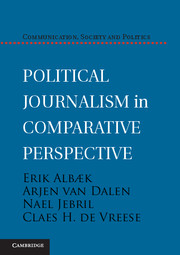Book contents
- Frontmatter
- Contents
- List of Tables and Figures
- Preface
- 1 Introduction
- 2 Comparing Political Journalism
- 3 Journalists
- 4 Journalists and Politicians
- 5 Do Role Conceptions Matter?
- 6 What Type of Journalism Produces Public Knowledge?
- 7 Does Infotainment Journalism Lead to Political Cynicism?
- 8 Good Journalism, Satisfied Citizens?
- 9 Political Journalism
- Appendix to Chapter 2
- Appendix to Chapter 3
- Appendix to Chapter 4
- Appendix to Chapter 5
- Appendix to Chapter 6
- Appendix to Chapter 7
- Appendix to Chapter 8
- References
- Index
3 - Journalists
The People Behind the Headlines
Published online by Cambridge University Press: 05 June 2014
- Frontmatter
- Contents
- List of Tables and Figures
- Preface
- 1 Introduction
- 2 Comparing Political Journalism
- 3 Journalists
- 4 Journalists and Politicians
- 5 Do Role Conceptions Matter?
- 6 What Type of Journalism Produces Public Knowledge?
- 7 Does Infotainment Journalism Lead to Political Cynicism?
- 8 Good Journalism, Satisfied Citizens?
- 9 Political Journalism
- Appendix to Chapter 2
- Appendix to Chapter 3
- Appendix to Chapter 4
- Appendix to Chapter 5
- Appendix to Chapter 6
- Appendix to Chapter 7
- Appendix to Chapter 8
- References
- Index
Summary
In our study of political journalism, political news, and its effects, we focus first on political journalists. Understanding who political journalists are and what their relationship is to politics and politicians is important for specifying the conditions under which journalism operates. Political journalism has been described as “‘the most sacred part’ of journalism” (Neveu, 2002, 23) because of its intermediary position between the political elite and the people. This central role in the democratic process makes political journalism one of journalism's most prestigious beats (Tunstall, 1970, 41, 71): political journalists are close to the center of power and in an exclusive position to report on matters of great national importance, such as national elections or cabinet decisions. Political news is highly visible, often covered on the front pages of newspapers or at the beginning of the evening news (McNair 2000). But given this proximity to the center of power, political journalism is also one of the most criticized beats. With a prestigious position come high expectations, and politicians, media scholars, the general public, and other journalists criticize political journalists for not living up to their role as the “fourth estate.” Critiques of political journalists are common and often center around journalists’ autonomy, roles, and demographic profiles. This position in the ‘front line’ in terms of critique will be investigated in the light of our three key concepts. We address the validity of this criticism across our four chosen national contexts and answer the questions: who are the political journalists and how do they view their role in the political process?
Journalistic Autonomy: Dealing with Pressures
As mentioned in Chapter 1, there is a largely negative discourse about journalists. A first critique centers around autonomy. Journalistic autonomy is the journalist's “latitude to carry out his or her occupational duties” (Weaver et al., 2007, 70). Deuze (2002, 5–6) describes autonomy as one of the defining features of a universal journalistic occupational ideology. Critics claim that journalists lack the necessary autonomy to fulfill their roles as democratic watchdogs.
Information
- Type
- Chapter
- Information
- Political Journalism in Comparative Perspective , pp. 34 - 51Publisher: Cambridge University PressPrint publication year: 2014
